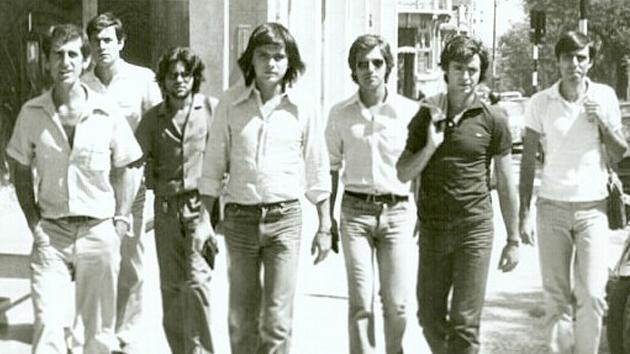Trovante started in the summer of 1976 in Sagres, when a group of friends (João Nuno Represas, Luís Represas, Manuel Faria, João Gil and Artur Costa) got together to make music.
In 1977 they recorded their first album Chão Nosso, with a strong political component allied to traditional Portuguese music. The following year they released the album Em Nome da Vida, an album that confirmed them as an important name in intervention music at the time.
From 1980 onwards, the group focused more on the traditional side. As a result, the album Baile no Bosque, released in the midst of the Portuguese rock boom, was a huge commercial success. In the midst of rock boom in Portugal, Trovante stood out in parallel. Songs like Balada das Sete Saias and Outra Margem were left for history.
Fernando Júdice and António José Martins joined the band, which then had seven members. One of the turning points in the band’s career was the concert in the Se7e newspaper, which made them better known.
In 1983, the album Cais das Colinas was released, with the famous Saudade theme, which featured José Salgueiro in place of João Nuno Represas, who in the meantime left the group. In 1984 they released 84, an album that contains songs like Xácara das Bruxas Dançando and Travessa do Poço dos Negros.
They were one of the first bands to book Coliseu de Lisboa for 3 days in a row (all sold out). One of the concerts at the Coliseu dos Recreios was attended by the then President of the Republic, Mário Soares.
In 1986, the album Sepes appeared, giving continuity to highly successful shows. That year, they were chosen to close the Avante party, having played for more than 100,000 people, a show that, in addition to music, offered a “spectacular laser performance”, a novelty at the time.
In the shadow of the Trovante, however, other projects had emerged, such as Charanga with the album Aguarela and Mafalda Veiga with Pássaros do Sul, and one could even speak of trovantism and post-trovantism, such was the importance that the group acquired.
The album Terra Firme with the songs Perdidamente (lyrics by Florbela Espanca) and 125 Azul was an openly pop work blurring the more traditional references. In 1988 the band risked an overproduction in Campo Pequeno resulting in a live album that quickly reached platinum status.
In 1990 the group released their last studio work Um Destes Dias with the great success Timor, which was however poorly received by critics.
The Trovante began their last tour before the final dissolution. Luís Represas and João Gil were the most successful in their later careers or, at least, those who remained more visible, with the remaining elements opting for careers further away from the limelight.
On May 12, 1999, in celebration of the 25th anniversary of the April 1974 revolution, the President of the Republic Jorge Sampaio invited the Trovante to gather for a show, held at Parque das Nações, which resulted in a double disc, DVD and in a television broadcast.
For the second time since their separation, they performed together on October 12, 2006, at Campo Pequeno, in Lisbon, at the invitation of Montepio Geral. This show was recorded on DVD but not commercially released.
On the 22nd of May 2010, on the second day of that year’s edition of Rock In Rio Lisboa, intended to commemorate the 25th anniversary of this festival, the group performed on Palco Mundo. Even before the concert, João Gil did not rule out the possibility of the band getting back together in the future.
On September 3, 2011, they got together again, at the 35th Festa do Avante to celebrate the band’s 35th anniversary. They performed on Stage 25 of April.






amazing voices, great songs